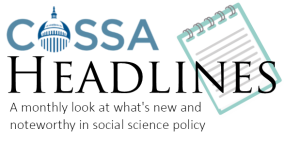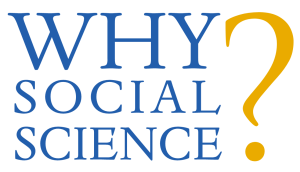Issue 17 (September 1)
COSSA Washington Update, Volume 39 Issue 17
Featured News
- National Academies Study on COVID-19 Vaccine Allocation Releases Discussion Draft, Seeks Feedback (Short Turnaround)
- Notable COVID-19 Resources
COSSA in Action
- September Headlines to Feature Deep Dive Discussion with Dr. Annette Anderson of the Johns Hopkins Center for Safe and Healthy Schools
- Psychology of COVID-19 Authors Answer “Why Social Science?”
- Letters & Statements
Congressional News
Federal Agency & Administration News
- White House Outlines FY 2022 R&D Budget Priorities
- Stakeholders Rally to Salvage 2020 Census
- NIMH Requesting Comments on Improving Mental Health Disparities
- Applications Open for FY 2020 Title VI International Research and Studies Program
- Nomination Opportunities
- Funding Opportunities
- Notices & Requests for Comment
- Open Positions
Community News & Reports
- SEAN Releases Guidance on Contact Tracing
- Nomination Opportunities
- Notices & Requests for Comment
- Recent Reports
COSSA Member Spotlight
National Academies Study on COVID-19 Vaccine Allocation Releases Discussion Draft, Seeks Feedback (Short Turnaround)
The National Academies of Sciences, Engineering, and Medicine (NASEM) has released a discussion draft of a Preliminary Framework for Equitable Allocation of COVID-19 Vaccine, part of a fast-track study initiated over the summer (see previous coverage). The discussion draft, released September 1, aims to identify priorities to inform allocation of a limited initial supply of COVID-19 vaccine, taking into account factors such as racial/ethnic inequities and groups at higher risk due to health status, occupation, or living conditions. Feedback will be collected during a public listening session on September 2 as well as through a written comment period closing on September 4. The fast track study intends to have a final report ready for release by early October. More information about the study, including instructions for submitting feedback, is available on the NASEM website.
September Headlines to Feature Deep Dive Discussion with Dr. Annette Anderson of the Johns Hopkins Center for Safe and Healthy Schools
 COSSA members are encouraged to sign up for the monthly Headlines webchat on Thursday, September 10 at 2:00 pm Eastern Time. The COSSA team will break down the most important social and behavioral science news from the past month, followed by a deep dive discussion with Dr. Annette Anderson, Deputy Director of the Johns Hopkins Center for Safe and Healthy Schools. Individuals employed by or affiliated with a COSSA member organization or university can register for the webchat here.
COSSA members are encouraged to sign up for the monthly Headlines webchat on Thursday, September 10 at 2:00 pm Eastern Time. The COSSA team will break down the most important social and behavioral science news from the past month, followed by a deep dive discussion with Dr. Annette Anderson, Deputy Director of the Johns Hopkins Center for Safe and Healthy Schools. Individuals employed by or affiliated with a COSSA member organization or university can register for the webchat here.
Psychology of COVID-19 Authors Answer “Why Social Science?”
 The latest Why Social Science? guest post comes from the authors of Together Apart: The Psychology of COVID-19, a free book from SAGE Publishing, who write about how social and behavioral science findings can be used to encourage people to take action to protect themselves and their communities from COVID-19. Read it here and subscribe.
The latest Why Social Science? guest post comes from the authors of Together Apart: The Psychology of COVID-19, a free book from SAGE Publishing, who write about how social and behavioral science findings can be used to encourage people to take action to protect themselves and their communities from COVID-19. Read it here and subscribe.
Fate of FY 2021 Funding and Coronavirus Relief in Limbo as Congress Returns
Lawmakers return from summer recess next week, leaving only 16 working days to act on funding legislation before fiscal year (FY) 2021 begins on October 1. As previously reported, the House passed its version of the FY 2021 appropriations bills in July, while the Senate has yet to release details of its bills. It is a near certainty that FY 2021 will begin under a continuing resolution (CR). Since it is an election year—one with major potential funding consequences—history suggests that a shorter CR will be enacted to keep the government running through the November elections. The next steps after that will depend heavily on the outcome of the election and which party will be controlling the House, Senate and White House beginning in January. Should there be a change in administration and/or party majority in one or both chambers of Congress, it is common for appropriations bills to be tabled until the new year to allow the new party in power to control the process.
What’s more likely to dominate attention in Congress over the next few weeks is the latest attempt to enact emergency funding to address the COVID-19 pandemic. Congressional leaders and White House negotiators made little-to-no progress over the summer, despite promises to broker a deal. As we head into the seventh month of the pandemic with the November election nearing, both parties are feeling the pressure to provide additional relief. Stay tuned to COSSA’s coverage over the coming weeks for the latest details on FY 2021 spending and COVID-19 relief and their impacts on social and behavioral science research.
White House Outlines FY 2022 R&D Budget Priorities
On August 14, the White House Office of Management and Budget (OMB) and Office of Science and Technology Policy (OSTP) issued a memorandum laying out the Trump Administration’s research and development budget (R&D) priorities for fiscal year (FY) 2022. The memo cites five key White House priorities and four “high-priority crosscutting actions” for U.S. federal agencies to consider as they develop their FY 2022 budget submissions.
While the FY 2022 memo shares similar priorities to R&D memos from previous fiscal years, a notable difference is the inclusion of public health security and innovation as a priority in light of the ongoing COVID-19 pandemic. The five budgetary priorities listed in the memo are:
- Public Health Security and Innovation
- Leadership in the Industries of the Future and Related Technologies
- Security
- Energy and Environmental Leadership
- Space Leadership
The memo also includes four “high-priority crosscutting actions” for federal agencies to better meet the budgetary priorities listed above. These four actions are:
- Build the S&T Workforce of the Future
- Optimize Research Environments and Results
- Facilitate Multisector Partnerships and Technology Transfer
- Leverage the Power of Data
Additional details can be found in the memorandum.
Stakeholders Rally to Salvage 2020 Census
With less than a month remaining before the Census Bureau plans to end all of its counting efforts for the 2020 Census, advocates are actively working to force the Bureau to take more time to ensure an accurate count. As previously reported, the Census Bureau announced in August that it would shorten its counting efforts by a full month, moving up its deadline from October 31 to September 30. According to the Bureau, the shortened timeframe is needed to in order to produce statutorily mandated apportionment counts by the end of the year. The House’s most recent coronavirus relief bill would extend that deadline, but the Senate has yet to act to do so. COSSA joined over 900 Census Project organizations in a letter to Senate leaders urging them to extend the statutory deadlines for reporting apportionment data in its next COVID relief package. In addition, Senators Brian Schatz (D-HI) and Lisa Murkowski (R-AK) led a bipartisan group of 48 senators calling on Congressional leaders to extend the deadline.
The Census Project has released a toolkit for individuals who want to take action in support of a fair and accurate 2020 Census. They encourage advocates to post to social media using the hashtags #SavetheCensus and #DontRushtheCensus. In addition, stakeholders can write to their members of Congress in support of the Census here.
NIMH Requesting Comments on Improving Mental Health Disparities
The National Institute of Mental Health (NIMH) within the National Institutes of Health (NIH) is requesting stakeholder comments to inform potential research seeking to improve mental health outcomes among minority and health disparity populations. The request specifically seeks input on how certain social determinants can affect mental health outcomes, how racial discrimination may affect mental health outcomes, potentially understudied social or behavioral determinants of mental health, ideas or innovations to reduce mental health disparities, promising interventions to treat mental health disparities, tools to properly measure mental health outcomes, and ideas on preventing racial discrimination at the individual, family, or community level. Comment submissions will be accepted through October 30, 2020. More information is available on the NIH website.
Applications Open for FY 2020 Title VI International Research and Studies Program
The International and Foreign Language Education Office (IFLE) within the U.S. Department of Education is accepting applications for the International Research and Studies (IRS) program for fiscal year (FY) 2020. The IRS program provides competitive grants to institutions and individuals to conduct research on improving education in foreign language and other international fields. Each year, the IRS program awards up to five additional points to applications that meet one of several competitive preference priorities. The priorities for FY 2020 are:
- Research on more effective methods of providing instruction and achieving competency in modern foreign languages, area studies, or other international fields.
- Studies and surveys to assess the use of graduates of programs supported under title VI of the HEA by governmental, educational, and private-sector organizations and other studies assessing the outcomes and effectiveness of supported programs.
- Developing and publishing specialized materials for use in foreign language, area studies, and other international fields or for training foreign language, area, and other international specialists.
Applications will be accepted through September 8, 2020. More information is available on the Department of Education website.
SEAN Releases Guidance on Contact Tracing
The National Academies of Sciences, Engineering, and Medicine’s Societal Experts Action Network (SEAN) (see COSSA’s previous coverage) has released a new rapid expert consultation, Encouraging Participation and Cooperation in Contact Tracing. The guidance draws on survey research to provide federal, state, and local decision-makers, with evidence-based strategies to enhance contact tracing efforts, such as partnering with trusted sources, offering incentives, giving advance notice, tailoring messaging, and accepting partial information. The guidance is available on the National Academies website.
Nominations Open for 2021 Moynihan Prize
The American Academy of Political and Social Science (AAPSS) is now accepting nominations for the annual Daniel Patrick Moynihan Prize in Social Science and Public Policy. The Moynihan Prize was created to recognize social scientists, public officials, and civic leaders who champion the use of informed judgment to advance the public good. The winner is recognized at a formal event to be (tentatively) held in 2021 and receives a $20,000 prize. The nomination form can be found here and nominations will be accepted until October 16, 2020.
APSA Launches Campaign to Increase Student Voting, Civic Engagement
The American Political Science Association (APSA), a COSSA governing member, has launched a campaign to encourage participation in the political process on college campuses. The RAISE (Resources to Amplify and Increase Student Engagement) the Vote initiative aims to provide the tools needed to effectively encourage student registration, voting, and democratic engagement. It provides concrete steps and best practices that faculty can use in the classroom and on campus to encourage student engagement and highlights the research, teaching, and service of APSA members related to civic engagement and voting, encouraging faculty to use these resources in their classrooms.
More information about the project is available on the RAISE the Vote website.

